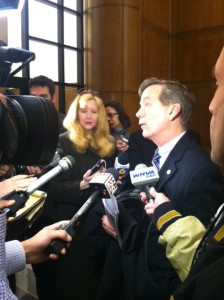4 tidbits about Virginia’s messed-up budget

Republican Del. Chris Jones, chairman of the House Appropriations Committee, is still skeptical about Medicaid expansion.
By Kathryn Watson | Watchdog.org, Virginia Bureau
ALEXANDRIA, Va. — Things already looked grim for Virginia lawmakers and Gov. Terry McAuliffe, who haven’t managed to agree on a budget with one month to spare before the majority of state government operations shuts down.
Things look even direr now that revenues are $300 million below expectations for the current fiscal year that ends next month.
Leading lawmakers say the state expects to collect about $1 billion less than it plans to spend in the next two years. Of course, lawmakers haven’t even finalized that two-year budget yet.
“While we will not know the final revenue numbers until the end of June, it appears very likely that the commonwealth could face a significant revenue shortfall for the current and next fiscal years,” Chris Jones, chairman of the House Appropriations Committee, said in a letter to the governor and others this week. “That shortfall could exceed $1 billion for the biennium.”
Whether the lower-than-expected revenues — i.e. tax collections — could have been anticipated or not, another way to look at the problem is that the state is simply spending more than it can rake in.
“The state is spending more money than it should be,” Bob Williams, president of State Budget Solutions, a nonprofit organization that advocates state-by-state fiscal reforms, told Watchdog.org. “… The answer always is, ‘let’s raise taxes,’ when the real problem is spending.”
Revenues aside, here are a few budget crunch-related tidbits.
1. There never was a surplus.
Former Gov. Bob McDonnell often touted his “budget surplus” accomplishments, but in reality, there is no such thing as a budget “surplus.” In the short run, yes, the state can generate and collect more revenue than it spends. In the long run, however, the commonwealth’s debt is more than $65 billion. That’s more than $8,000 for every man, woman and child in Virginia. As long as Virginia has debt, it will, in a sense, always be trapped in a shortfall.
2. The budget has been mushrooming.
Over the last decade, both Republican and Democratic leaders have allowed the state’s operating budget to mushroom by 62 percent, or 20 percent when inflation and population growth are taken into account. From 2004 to 2013, the state’s annual budget grew by $16.3 billion, according to a report by the Joint Legislative Audit and Review Commission. McDonnell, dubbed a fiscal conservative by many, proposed the largest biennial budget in Virginia’s history at $96 billion — $10 billion more than the current biennial budget.
3. Corporate handouts bloat the budget.
McAuliffe wants to boost corporate welfare handouts to $136 million over the next two years, a 24 percent increase. Plus, he wants to subsidize technology companies with another $22 million. And this year, state lawmakers voted to boost tax breaks to film companies by even more millions. They’re the kind of handouts Matt Mitchell, a senior research fellow with George Mason University’s Mercatus Center, calls “unsustainable.” Yet Virginia continues to spend millions upon millions on corporate welfare.
4. Virginians want to fix revenue gaps with spending cuts.
When a similar budget situation arose in 2008, Virginians said they would rather fix a revenue shortfall with spending cuts than anything else. In a poll by Christopher Newport University’s Center for Public Policy, 56 percent of respondents said they would choose to fund a revenue shortfall by cutting spending rather than increasing taxes or dipping into the state’s rainy day fund. About one-third of respondents supported cutting spending and dipping into the rainy day fund, and just 10 percent supported raising taxes to fix the gap. The poll was conducted from Jan. 8-10, 2008, with 700 registered voters and an error rate of plus or minus 3.7 percentage points.
“I think Virginia’s political culture on fiscal issues is pretty conservative,” said Quentin Kidd, director of CNU’s Center for Public Policy who conducted the 2008 poll. “It’s deeply rooted in Virginia’s political history. We could go back to the pay-as-you-go approach of the (Harry) Byrd machine. And so when you see surveys like the one we did in 2008, I’m sure if we did one now you would find a good proportion of the electorate who would want to cut spending or cover a gap in some other way other than raising new revenue, because I think it really speaks to the fiscally conservative political culture that is still pretty strongly prevalent in Virginia and has a deep historical footing in the commonwealth.”
— Kathryn Watson is an investigative reporter for Watchdog.org’s Virginia Bureau, and can be reached at kwatson@watchdog.org, or on Twitter @kathrynw5.







